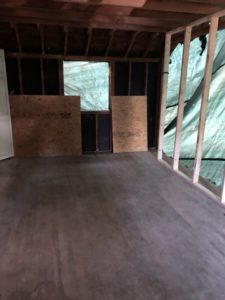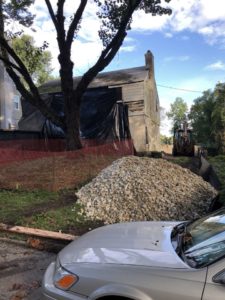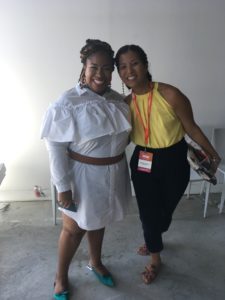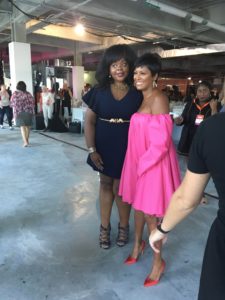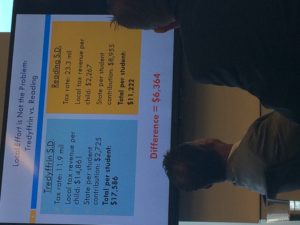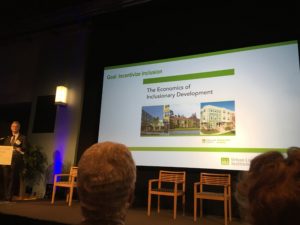That was a quote from Morgan Berman, CEO of MilkCrate- which was sort of my theme/takeaway from the PA Conference for Women- which I attended on Friday, October 12th- along with 12,000+ other people- including men! Below is a re-cap of people/books/quotes that resonated with me that I hope you will look into as well. It wasn’t too long ago that I shared my blog post about about the BlogHer event in NY and learned about Tiffany Dufu, founder of TheCru, which I am now a proud member of, along with 9 other ambitious women that will help me achieve my intentions! If you haven’t heard of The Cru, learn more about it here: Find Your Cru
Overall, I thought there was a ton of content- I learned a lot about people/companies/topics that I would not have been aware of had I not attended. I think it’s a great event to attend if your intention is to come back with a few nuggets to help build yourself/your business. The majority of the topics were geared towards people working in corporations, that didn’t apply to me- which makes sense, since many of the sponsors were large companies- Beneficial, Jefferson, GSK, etc. Would I go again? Yes- but it would depend on what topics are covered- specifically surrounding issues that face entrepreneurs. It just so happened that a few topics were areas that I was interested in, that could be applied to my business- but that may not always be the case.
Morning keynote:
Amal Clooney– What a beautiful human, inside and out- an attorney/activist for human rights and has represented people like Nadia Murad, Nobel Peace Prize winner- who have been victimized by genocide, mass atrocities, and human trafficking.
Amanda Southworth– a 16 year old who created the app Anxiety Helper, for those with mental illnesses and Verena, a security system for members of the LGBTQ community-
Session 1:
Jenn Welter, author of Play Big– shared her journey on becoming the first female coach in the NFL for the Arizona Cardinals and revealed her nuggets on how she was able to lead her team effectively. I loved her approach because when I think of leading a bunch of men- football players nonetheless- I would never think that gaining their trust and connecting with them personally, would give her an edge. In thinking about it- when men have only been lead by men- they’ve only gotten that approach/perspective. Being coached by Jenn was probably a long overdue breath of fresh air. Emotional intelligence played a huge role in leading to her success- as well as being AUTHENTIC- which is a message I hear constantly! Few quotes that she shared:
“Even as a coach, you need to be coached”
“People you lead have to feel like you’re human”
“Perfect is not human”
“Get Buy In from the players (or key stakeholders) before getting buy in from the top/decision makers ”
Session 2:
Sally Helgesen co-author of How Women Rise lead a panel discussion that covered key topics in the book and included
Panelists:
Dani Rylan, founder, National Women’s Hockey League and Fast Company “Most Creative People in Business 2016”
Fran Hauser, author, The Myth of the Nice Girl
Karen Etzkorn, CIO, Qurate Retail Group
There were so many quotes/tidbits that I took away from this discussion and am eager to get to listening to the book! But one thing that brought me to tears was when Karen Etzkorn shared that women tend to be reluctant on sharing their achievements. This is a huge thing for me that I need to get over. I’ve definitely had moments where I felt like I wasn’t delivering my best self as a mom, business-owner, wife and once I get down a path, it just opens up Pandora’s box. But she said, look in the mirror and just say, “Look at what I’ve done!” Just writing that made tears well up in my eyes. I need to focus on the good I do and what I’ve accomplished vs. the opposite. Doing this is definitely something I intend to do whenever I fall into a moment where I feel like I’m falling short. How many times have you not given yourself enough credit and fell down tquote le of not feeling like enough? That affirmation is something that I always need to keep in mind to help me see and acknowledge what I’ve accomplished.
Afternoon keynote:
Serena Williams: New mom, elite athlete- extraordinary and ordinary all at once
I mean, I know Serena Williams and what she stands for. But I totally connected with her journey about being back in the finals less than a year after giving birth to her daughter- and the internal struggles she shared as being an elite athlete and a mom. I mean- not that I’m an elite athlete- LOL but her journey as someone who wants to be great at her career and as a mom, and the struggles that come with are so common. Being in the presence of greatness really does something to me, and seeing/hearing her talk and realizing she’s just as human as anyone else and the only difference between her and everyone else is where she focuses her time and energy. Aside from being there to share her journey as an elite athlete and a mom, she wanted to raise awareness for maternal health, specifically for black women and domestic violence survivors. Purple Purse is a cause that she supports to help victims of domestic violence rebuild their lives.
Some quotes she shared:
“I’m obsessed with breaking records and making history”
“Success of one woman should be an inspiration to the next”
Session 3:
By this time, I was already tired from the day- but still felt I gained some info re: companies/people/topics that I should be keeping on my radar!
Nathalie Molina Nino, CEO, Brava Investments and author, Leap Frog: 50 Hacks for Women Entrepreneurs lead a discussion surrounding social impact investing. This is a topic that I’ve been doing a lot of digging around- so I intend on writing up another post re: this. People, specifically women and millennials, are increasingly becoming more conscious about the products they consume and the companies they invest in. On the panel were:
Morgan Berman, social entrepreneur & CEO, MilkCrate @morganberman
Gayle Jennings-O’Byrne, founder and CEO at iNTENT Manifesto
Sally Susman, EVP, corporate Affairs, Pfizer
Things I intend to keep on my radar:
http://conference.ic-svn.org/
Our Story
Pipeline Angels
SheEO
BRAVA Investments
100WomenPhiladelphia
Alliance of Women Entrepreneurs
BlockChain
When responding to political issues, Sally Susman of Pfizer suggested that the company has criteria which it uses to decide whether it needs to respond:
– Is it relevant to our purpose?
– Is it important to key stakeholders?
– What options do we have if we choose to respond?
– What is the price for not responding?
I thought this criteria was a useful way to decide how we spend our time and be intentional about it.
– Is it relevant to our purpose? (does this action/person/activity align with my purpose?)
– Is it important to key stakeholders? (Is this action/person/activity important so that I can better serve the people that matter to me/my business?)
– What options do we have if we choose to respond? (What are the potential outcomes of doing this?)
– What is the price for not responding? (What are the pros/cons of doing this?)
Yes, this post was sort of a ramble, but there was so much content to be shared- hopefully you get 1 or 2 nuggets out of it!









